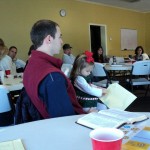Replay: A biblical theology is a practical theology
Four years ago, I wrote a post called “A biblical theology is a practical theology.” The post was inspired by several things: a couple of blog posts that I read at that time plus several years studying “biblical theology” in many different forms. There are many theoretical theologies around today – and there have been theoretical theologies around since time began. However, the “theology” that we read about in Scripture is not theoretical – it is extremely practical. And, in fact, even when we discuss theoretical theologies, our real theology is the theology that we live.
———————————–
A Biblical Theology is a Practical Theology
There is a very interesting and very important discussion occurring in a couple of blogs. It was started by Jeff (at “The Practicing Church“) in his post called “Practicology.” After reviewing the many “-ologies” which various groups espouse or emphasize, Jeff makes the following statement:
Truth is, I’m not as impressed by how much someone knows about the Bible as I am whether someone is living out what they know.
Jeff concludes with this statement:
So if there’s an ‘-ology’ I’d coin to describe all this – I’d want it to be ‘practicology’ – the study of putting our faith into practice. A faith that works itself out in life.
Laura (at “Who in the World Are We?“) continues Jeff’s discussion in her own post called “Practicclesiology” which is focused primarily on a practical ecclesiology – a practical understanding of the church.
Laura describes the theory of ecclesiology like this:
The theory of ecclesiology consists of the rich, deep biblical truths, describing our safe identity and position in Christ as persons and community. Properly understood, these truths help us, persons and community, to live ordinary lives of risky creative participation in the world for the sake of Christ.
Next, she defines the practice of ecclesiology like this:
The practice of ecclesiology consists of the extensive and intensive influence of a church, grounded in proper understanding. A properly functioning church (persons and community) moves into the world in Christ and by the Spirit, applying a rich diversity of skills to live boldly in the world while pointing to Christ.
Finally, she combines the two into practicclesiology (a term she coined):
In sum, practicclesiology is a manner of life together that understands and lives out deep connection to Christ and one another in order to dream and risk the seemingly impossible.
In reality, it is impossible to have a biblical theology that is not practical. A biblical theology is a practical theology.
Now, I understand why Jeff and Laura are concerned about the distinction between theoretical theology and practical theology. Discussions about this distinction and arguments as to which is more important have been going on for centuries and longer.
However, when we study Scripture, we find that it is impossible to separate our thinking about God (theoretical theology) from our life (practical theology). In fact, according to Scripture, the way we live demonstrates what we actually think about God more than what we say.
In 1 John, the apostle makes the bold statement that someone who does not demonstrate love to another person does not love God, regardless of what that person may say (1 John 3:17; 4:20). James writes something similar about faith – faith that does not demonstrate itself in our lives is not faith at all (James 2:14-26). Paul follows his most theoretical argument (Romans 1-11), with an exhortation to live in accordance with this understanding (Romans 12-16). As followers of Jesus Christ, an understanding of God that does not demonstrate itself in the way we live is not a biblical theology.
How does this work with the church?
People discuss and argue about many aspects of ecclesiology. For example, many argue about whether the Lord’s Supper (Communion) should be for local church members only (closed communion) or for any believer (open communion). Someone once tried to convince me of closed communion by arguing that we should only share the fellowship of the cup and the bread with those we know. However, as I pointed out, he cannot know all the thousands of people that he meets with every Sunday. His theoretical argument for “closed communion” was nullified by his own practice.
There are positive implications of our practical theology, and practical ecclesiology in particular. For example, last Sunday we were talking about times in our lives when we grow indifferent to God. One brother said, “This is one of the reasons that I love this church, and one of the reasons that I hate this church. I know that when we meet together, someone is going to ask me about my life and my relationship with God. This is exactly what I need, but its not always what I want, especially when I’m feeling indifferent toward God.” He’s learned that our ecclesiology is not simply theoretical… we don’t just talk about fellowship and discipleship and the “one anothers”. Instead, we try to live these things. Our ecclesiology is very practical.
In fact, besides this blog (and times when I meet with people who contacted me because of this blog), I rarely talk about “ecclesiology.” It is more important to live our ecclesiology (or any theology) than to talk about our ecclesiology (or any theology).
Someone who does not offer grace and forgiveness to others does not understand the grace of God regardless of what they say or teach about God’s grace. A person who does not accept others as they are does not understand how God has accepted us in Christ, regardless of what they say about salvation by grace and not by works. Someone who does not share his or her life with other brothers and sisters in Christ in intimate fellowship and community does not understand discipleship, regardless of what they profess about the importance of the Great Commission. Our theology is demonstrated in the way we live our lives, not in what we say or write.
This distinction between theoretical theology and practical theology is a false distinction as far as Scripture is concerned. According to Scripture, it is impossible to know God (theology) without it affecting your life (practice). So, a biblical theology is a practical theology. A theoretical theology that does not affect a person’s life is not a biblical theology.
Transitioning toward participatory church gatherings
Yesterday, on Dave Black’s blog (Thursday, July 18, 2013 at 7:48 a.m.), I read a snippet of an article on the website of Milipitas Bible Fellowship written by Brian Anderson. The article is called “Discovering Participatory Church Meetings.”
The article includes some great historical information, from the Jewish background, to New Testament evidence, into the second through fourth centuries, and even including the reformation. At each point, the author explains what was happening historically and how those events and circumstances affected the way that believers gathered together.
But, my favorite part of the article is near the end and is called “Our Journey in Implementing Participatory Meetings.” I love how the author explains some of the steps they took together to help each other understand why it’s important that they all participate together when they gather with the church.
For example, here’s one “step” in the process:
After a few months, as we became more comfortable with these informal home meetings, we began introducing more participation into our Sunday gatherings. I informed the congregation that anyone could participate by reading Scripture, praying during a lull in our praise singing, or starting a song that was on their heart. I brought the podium down from the platform to the lower level so that I could be closer to the people, thereby encouraging mutual interaction. We rearranged the chairs into concentric semi-circles so that we could look into one another’s faces when speaking, instead of the back of someone’s head. We bought a wireless microphone and began passing it around to those desiring to share what God had been doing in their lives or to encourage us by declaring what God had been teaching them from His Word. Sometimes these sessions included exhortations, admonitions, teachings, or the sharing of blessings or burdens. One woman revealed that she had recently been diagnosed with cancer. This allowed the whole church the opportunity to tangibly express their love and commitment by gathering around, laying hands on her, and praying. These changes felt a bit awkward at first. We had no previous model to guide us, and thus, felt a bit uncomfortable with them. Before long, however, many began contributing some very edifying insights and exhortations.
Take the time to read this great article, especially that last section. Many people believe that “traditional church” can never change. It’s just not true. It’s happening more and more.
However, in order for this kind of change to be effective, we must make careful changes, caring about the people involved more than we care about making sure we’re doing everything right.
For many of my readers, the quotation above sounds overly rigid and controlled. For others, it sounds incredibly freeing. For still others, it looks strange, alien, and completely impossible.
For me, the exciting part of this article is that they realized they needed to change, and they took the steps necessary to implement that change in a way that worked for them.
Community based on the gospel and our shared identity in Christ
A couple of weeks ago, I read a great post by Fred at “On the Journey” called “Community: Sunday at 10:30.” If you’ve read this blog for very long (probably even for a short time), then you know that community in Christ is very important to me.
I believe that when God saves us, he immediately includes us in his family and we are immediately connected to and responsible for our brothers and sisters in Christ who are part of our lives. This “community” is not one of our own making; it is built by God through his Spirit. We do not get to pick and choose who are part of that community. As I wrote once, when we accept Jesus, we automatically get everyone else at his table.
However, it takes work – yes, real work – to live in community with one another. Now, we say that work consists of yielding to or submitting to the Holy Spirit in our lives, and that would be correct. It is still work, though.
Of course, we can also try to build community that is not based on our shared identity in Jesus Christ. There are many kinds of communities like this. In his post, Fred wrote about several of those communities. Then he wrote this:
I believe the church is different. Community is something that is not based on personal preferences, on a charismatic individual, on shared experiences. In the church, the only kind of community that matters must be based on the Gospel and our shared identity in Christ. The community that God wants is a community that lives life together, learning together to follow Jesus and love our brothers and sisters. In order to do this we must be together more than one day a week. Community needs time and contact to develop. The disciples were with Jesus 24/7 for three years. The first Christians met daily, going from house to house. I know things are different in the 21st century, but we still need time with each other often. We can not do this without learning from each other on a consistent basis.
There is much to encourage us and challenge us in that short paragraph. Yes, it takes time, patience, grace, forgiveness, etc. to see community – even community in Christ – grow and flourish. And, it does take the humility necessary to “learn from each other on a consistent basis.”
But, when you read that, you may be disheartened because you are part of a group who only meets once a week in a pre-planned, scheduled gathering (often called a “worship service”). Does this mean that community in Christ is impossible for you? Not at all.
This is how Fred ends his post:
If you are part of a church body that meets in a building at a particular time on a particular day and gathers as friends and family at various times throughout the week, good for you. If not, why not begin?
Good question, Fred. Why not?
Ministry, leadership, seminaries, and the church
Yesterday morning (July 4, 2013 at 7:55 a.m.), Dave Black shared some of his thoughts related to ministry, leadership, seminaries, and the church. His observations and conclusions come from studying the New Testament as well as working closely with the church in Ethiopia for the last several years.
A couple of years ago, I had the opportunity to travel to Ethiopia with Dave. I saw the work that God was doing through him and many others there. I also observed many of the same issues that he illustrates below.
However, I think these same problems are alive and well among the church in the United States.
Here are his “thoughts” related to ministry, leadership, seminaries, and the church:
1) Most of the “ministry” in Ethiopia is done by ordained clergy who are seminary trained and are paid for their ministry. Often the people perceive them to be the ministers of the church. Becky and I are committed to involving more of the Body in ministry. And we are training the leaders of the local churches to do their best to equip others (2 Tim. 2:2).
2) The resident seminaries in Ethiopia are usually geared to training academically superior leaders who are required to dislocate themselves from their homes and communities for at least 3 years. This model of education, as I have often said, is beset with 3 problems: extraction, expense, and elitism. Extracting leaders from their communities is very expensive and often leads to a sense of elitism among the graduates. We are beginning to train leaders in their home environments. We do not believe that servants-in-training need to be uprooted from their homes. Nor do we believe that theological education need involve formal schooling; indeed, traditional theological education is, we are sadly discovering, often a disadvantage.
3) We believe that the best leadership development occurs in local churches. Students should be living in their homes, serving in their churches, and active in their communities as they exercise teaching, preaching, administrative, and evangelistic functions. Again, our experience has shown that when we extract students from their culture, many of them are unwilling or unable to return to the towns from which they came.
4) What should be the curriculum of leadership training? We believe that the best textbook is the Bible itself. Hence the scholar-teachers who come with us to Ethiopia do verse-by-verse exposition of a book of the Bible with a constant focus on practical ministry.
I suppose our convictions might be summarized as follows.
- All believers are called to be ministers in building the kingdom of God.
- Spiritual leaders have the responsibility to equip all members of the Body to serve.
- Theological education is best accomplished on site rather than in faraway seminaries.
- Theological education finds its fulfillment within the framework of the local church.
- The proper end of all theological training is ministry, not degrees or ordination.
- The aim of teaching is not to impart knowledge but to produce obedient disciples.
- If a man is seminary-trained but not living in a manner that is obedient to the commands of the Lord Jesus, he is not qualified to lead.
By the way, while you’re thinking through some of these things, please pray for Dave’s wife BeckyLynn. You can read about what she’s going through in her essay “Running to Home Base.”
Leaving the distractions without leaving the church
Last week, my good friend Eric from “A Pilgrim’s Progress” wrote a post called “Not Looking for the Perfect Church. Just Looking for the Church.”
In the post – and as the title suggests – Eric explains that he did not leave “the institutional church” in order to find “the perfect church.” Instead, he says, he was simply looking for church.
At one point, Eric wrote:
Many of the things that pass as the church today are not the church. I can list a few that we are all familiar with: the building, the worship service, the clergy, the tithe, the youth group, the sermon, etc. It is for many of these reasons that we left the institution never to return. We weren’t looking for something better; we were looking for something qualitatively different.
In response, a commenter by the name of “die” (I’m assuming that’s the German definite article…) asked the following question:
Can you list the distinctions between “The Church” and its less ideal institutional counterpart?
Eric pointer the commenter to some of the blog posts that he’s written in the past on the topic. But, Eric’s post and the commenter’s question swirled around in my head for a few days.
Like Eric, people have often suggested that I’m “looking for the perfect church” or that I’m “angry with church leaders” or that I just want things my way. Interestingly, none of those are true. Like Eric, I know that no group of people – however mature in Christ they may be – will be “perfect,” at least, no in this age. Also, looking back over my experiences, I’m not angry with any church or church leader or denomination or anything like that. Finally, the group that I meet with does not do everything “my way,” so that can’t be it either.
So, why do I prefer to meet in a way that is different from the way most traditional churches meet? Why do I define the church in a way that is quite different from the traditional definitions? Why do I seek to share my life (fellowship) in a way that crosses boundaries normally erected by “local churches”? The answer to all those questions is the same: maturity in Christ.
The things that Eric lists above – building, worship service, clergy, tithe, youth group, sermon – and other things like those are often considered to be part of the nature of the church. In fact, many could not imagine the church without many of those things.
But, to me, those things are usually distractions that hinder the growth of the church. According to Scripture, several aspects of our shared life with Christ and our shared lives with one another facilitates our spiritual growth and maturity: fellowship and mutual (“one another”) discipleship/edification.
It’s never my desire to separate from my brothers and sisters in Christ – even if they want to meet in traditional ways that I think are less healthy to they spiritual growth. Unfortunately, when people’s identity as the church is tied up in those activities that I consider hindrances, it limits our ability to share our lives with one another. So, while it may appear at times that I’m “leaving the church,” it’s really a desire to leave the distractions, never the people themselves (who are the church).
[By the way, in the image attached to this past, the line of text at the bottom – which is difficult to read – says, “Distractions can seem important at the time, though later you realize that it was what was around it that was important…”]
Where are the organic/simple church people hiding?
Last year, two of my most read posts were “People want real examples of organic church life” and “Why is it so difficult to find organic church life?”
In those posts, I talked about how people are tired of theory and simply talking about organic/simple church. But, when they look for real, living examples of these groups of Christians, they often can’t find them. There are many reasons for that, beginning with the fact that most groups are not incorporated, they don’t advertise/market, they don’t have a big, flashing sign with a cute saying, etc.
So, if someone wants to meet others who are interested in this different kind of “church life,” what should they do?
Now, Nathan at “Joined to Him” has written a very good post called “7 Tips on How To Find Organic Church Life.”
After a brief introduction, he offers these seven tips:
1. Pray, pray, and pray some more.
2. Join Facebook Groups dedicated to Organic Church Networking.
3. Follow up on potential leads.
4. Start a blog and talk about your journey and desire for organic church community.
5. Start small and trust the Lord.
6. Move to a new location.
7. Lower your expectations.
(Please take the time to read Nathan’s post. He explains and gives examples for each of his seven tips.)
What do you think about Nathan’s tips? What would you add, remove, or modify?
Real relationships centered on Jesus Christ
Last week, I published a post called “What do you want to talk about?” In that post, I asked my readers what topics (related to the church) they would like to discuss.
In some ways, I was surprised at the responses in the comments. Usually, when I ask a question like that, I hear responses like “elders/pastors/leaders,” “the Lord’s Supper,” “church discipline,” “preaching/sermons,” etc.
But, the responses that I got this time were quite different:
“I’m just wondering if other believers are as discouraged and concerned about the decay of real community and fellowship even in the churches small group settings?” -from Glenn
“Maybe some concrete examples, suggestions, and tips on how to build relationships and friendships with people in our community, …especially when you live in a new area and don’t know anyone.” -from Jeremy
“I would be interested in hearing stories of how others are going about making disciples in their neighborhoods.” -from Mark
“Open fellowship is great, and the Lord does work sovereignly in that context, but there seems to be a difference when the headship of Christ is collectively sought. I’d love to hear your thoughts on how that can be more intentionally pursued and lived in by a body of believers.” -from David
Did you catch the common theme? Relationships. But, I think each of these commenters would agree that they are not interested in just any relationships. They are interested in relationships which are centered on Jesus Christ.
So, how do we pursue relationships with one another while continuing to pursue Jesus Christ together? What if we do not know anyone in our area (perhaps we are new to the area)? How do foster those relationships into mutually discipling relationships (or is that automatic if our relationships are centered in Jesus Christ)?
I think these are good questions – much better than the questions that I usually see people asking about the church. I think these are foundational questions. And, I also think that if we do not seek these kinds of relationships (centered in Jesus Christ), then it doesn’t really matter how we answer the earlier questions about elders/pastors, the Lord’s Supper, etc.
Relationships are easy to discuss on a theoretical level. But, in reality, they’re much harder to live. They’re messy. How we share our lives with one another (or don’t share our lives with one another) is a very good indicator of our relationship with God, however.
So, I’m glad that my readers are interested in discussing real relationships with one another which are centered on Jesus Christ. It’s a scary topic however…
Let’s all stand and worship the Lord together…
If you follow me on Twitter (@alan_knox) or if you “like” my Facebook page, then you know that I link to several older posts each day along with linking to my new post of the day. I started linking to this older posts a couple of years ago in order to continue the conversations on those posts, and it has worked tremendously!
For example, yesterday I linked to a post I wrote two years ago called “Why keep the worship service?” Believe it or not, my thoughts about the church began to change drastically when I began to study the “worship service” from the perspective of Scripture. In short, I couldn’t find it. Instead, I found believers gathering in completely different ways from the “worship service.”
In response to that link yesterday, Doug from “With your Latte” (a great blog name, by the way) left a comment on my older post and wrote a post of his own called “Why a Worship Service?”
In part of that post, Doug writes:
I have questioned the worship service many times myself and have asked others about it. The question of doing away with the worship service is normally met with a look of puzzlement. The idea of not having “church,” in the tradition sense, is just too far of a reach – its a foreign concept to be embraced only by the poor and/or persecuted. Besides, where would the clergy find employment? – (that was some of the cynicism i mentioned)
Before you brush off this question, ask yourself where in Scripture we find a description even remotely similar to the modern “worship service.” For something so important that it defines most church groups today, you would think it would be found somewhere in the New Testament at least… in one of the passages that discusses believers gathering together. But, no.
A few years ago, I made an interesting discovery. During the “Reformation,” Martin Luther took the Roman Catholic Mass and modified it slightly and called it “Divine Service” (i.e., “worship service”). This is the pattern that most Protestant (non-Catholic, non-Orthodox) church groups follow today – both “traditional” and “contemporary.” Oh, sure, there may be differences here and there, but for the most part, it’s the same.
But, guess what? Luther designed this “worship service” for unbelievers, not for the church. Luther did not believe that “true believers” should meet in this way. He had a different kind of gathering in mind for Christians, but he could not find anyone interested in this other kind of meeting. In other words, Luther was suggesting something very similar to how “house”, “organic”, “simple” churches gather today. (For more information about Luther’s different kinds of “divine service” see my posts “Luther and the non-Christian ‘worship service’” and “Luther and the Church.”)
So, I’ll ask the same question that I asked in that earlier post: Why keep the “worship service” for the church?
Watch out! There are troublemakers everywhere!
It’s true. There are troublemakers everywhere on the internet. So, watch out!
Here are a few you definitely want to watch out for:
Miguel at “God Directed Deviations” is asking about tiers and levels of authority among the church in his post “Of Hierarchy, Tiers, and Levels of Authority Within the Church.” That topic always causes trouble.
Dan at “Cerulean Sanctum” retells a scriptural story from a modern perspective in his post “When Right-Hearted Christians Defend Wrong-Headed Theology.” Modernizing stories like this always bring them close to home… which causes trouble.
On his blog, Brant adds a post to his feature “If Jesus Had a Blog.” The post is called “If Jesus Had a Blog: I Told that God Loves the World.” God’s love toward anyone but us causes trouble.
Kathleen at “Church in a Circle” caused trouble for some of her friends. She recounts the story in a post called “Help! I can’t go back to ‘normal’ church.” Now, that’s trouble. (I wonder how they spell “trouble” Down Under.)
See what I mean. Trouble everywhere.
Watch out for these kinds of people, or you may find the way you think about the church changing… and that can be real trouble.
Put off the old… Put on the new
The title of this post comes from Ephesians 4:17-24, specifically Ephesians 4:22-24. For those of us who are in Christ, Paul says there is a putting off of the old and a putting on of the new. He uses imagery of taking off old clothes and putting on new clothing to refer to a work that continues to take place in each of our lives. Of course, this work is impossible without Christ, and is only possible through him. But, it is still something that we must choose to do.
Randi from “Seeds in my Heart” has written a very good post called “Putting off… putting on.” Her post is a reflection on a series that I wrote a couple of weeks ago on the topic of love. But, as usual, Randi takes a general topic and makes it extremely personal.
As she works through this idea of “putting off,” she wonders about being fake. I think this is a really good thing for us to think about, and I love her thought process in this post.
But, at one point, she ties this process (which seems to be a personal process at face value) back to our community in Christ:
This is why safe places of close intimate relationships are so important and so powerful. We seem fake to each other… because we are only seeing the putting on!! We seem fake to each other because a) sometimes we are being fake because we are not putting off…. or…. b) we are distant from each other so we don’t see the whole process! We only see the putting on.
When we see the whole process that God is doing… when we see the wrestling and the taking off and confessing and turning —- then we will see the whole process and God’s transforming work.
We also have to desire to show each other so much more than just the realness of our old self. We have to encourage each other to allow Him to clothe us. To encourage each other with truths like we have been blessed with every spiritual blessing (Eph 2:3) in Christ.
This is so true. Both the “putting off” and the “putting on” are community processes. But, we must be honest with ourselves and one another in order for this to be so. If we can’t be honest about what we’re putting off, we’re not really being honest about what we’re putting on. Plus, others need to see both our “putting off” and our “putting on.”
(By the way, one of the reasons that most people feel isolated among the church is that they don’t know that others have problems, too. They only know about their own issues..)
Last weekend, when we were gathered with some of our brothers and sisters in Christ, someone asked about struggling with being loving. Several people shared suggestions, scripture passages, advice, etc. I decided to share an example from the week before in which I did not reply to a situation in a loving manner. I still had something to “put off.”
I’m not proud of the way that I responded to that situation. I wish that I had responded in a loving manner. But, I’m willing to share the truth about myself with my brothers and sisters in Christ. It’s only when they see what I still need to “put off” that they will see the work of God as I continue to “put on” the new man in Jesus Christ.









